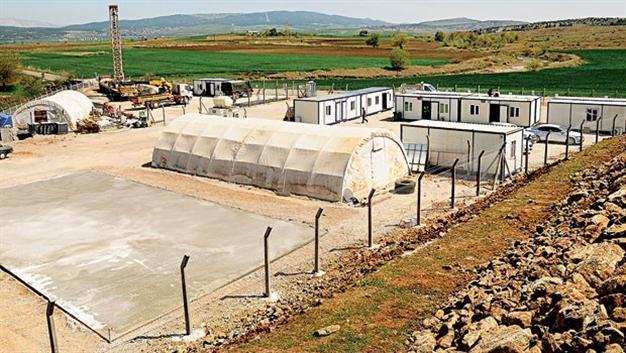Turkish villagers rally against refugee camp plans, citing fear of Sunni extremists
İdris Emen - KAHRAMANMARAŞ
 Locals from predominantly-Alevi populated villages in the southeastern province of Kahramanmaraş continue to rally against plans to build a container city for around 27,000 Syrian refugees, citing fears that ethno-religious tensions may be stirred with the potential arrival of extremists.
Locals from predominantly-Alevi populated villages in the southeastern province of Kahramanmaraş continue to rally against plans to build a container city for around 27,000 Syrian refugees, citing fears that ethno-religious tensions may be stirred with the potential arrival of extremists. “Many refugees hold Alevis responsible for the civil war in Syria. Sectarian conflict may be triggered. What will happen if people with links to ISIL [the Islamic State of Iraq and the Levant] or al-Nusra settle in these camps?” said Mehmet Caner, the village head of Sivricehöyük.
He was speaking as locals from 24 predominantly Alevi villages in the Dulkadiroğlu district of Kahramanmaraş continue to express uneasiness about plans to build a refugee container city on a nearby pasture.
“They say that they surveyed 16 different areas for [building] the camp and decided that this was the most suitable place. Why is a predominantly-Alevi region chosen ahead of 16 other options?” Caner asked, suggesting that the refugee population would dwarf the number of local Alevis, who only number around 6,000.
Another villager from Sivricehöyük, Hasan Yıldız, claimed that the particular pasture chosen by the authorities for the camp had been selected in order to supply “cheap labor” for an organized industrial zone that will allegedly be built nearby.
“There are plans to build a second organized industrial zone close to the camp. They want to build a camp [here] in order to supply cheap labor for that zone,” Yıldız said.
He also added that they were continuing to “keep guard” at the local village cemevi, an Alevi house of worship, against the construction of the camp, after the gendarmerie intervened against earlier protests and removed their tents.
Meanwhile, the Alevi Cultural Association provincial head İbrahim İnçoğlu highlighted the sensitivity of the ethno-religious profile in Kahramanmaraş, warning about decisions that could trigger conflict.
“Alevis and Sunnis have learned to leave together peacefully in Maraş. So we all must avoid actions that might threaten this peace,” İnçoğlu said, referring to the Maraş massacre of 1978 when over 100 Alevis were slaughtered by right-wing ultra-nationalists in the city.
“We are not against refugees. We are just afraid that ISIL and al-Nusra militants will infiltrate into camps and harm the Alevis in this region,” İnçoğlu added, voicing a common concern among the locals.
Through 1978 and 1980, in the run up to the Sept. 12, 1980 military coup d’état, Alevis were subjected to mass killings not only in Kahramanmaraş, then called Maraş, but also in Sivas and Çorum by ultra-nationalist groups.
An appeal by villagers for “urgent stay of execution” for the container city plan has already been filed to an administrative court, with locals citing fears that “Syrian jihadists” would be settled nearby.
















